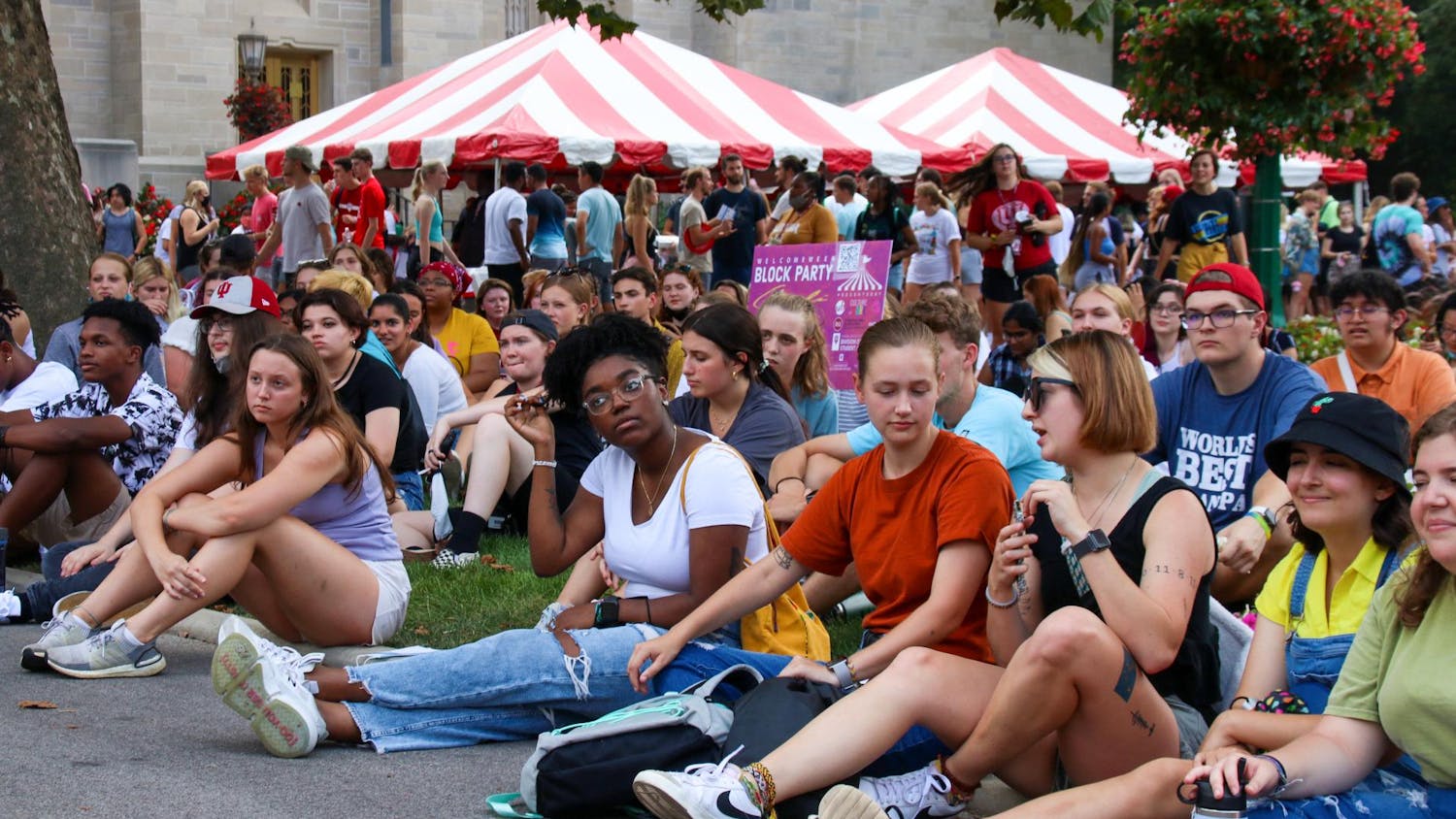With Election Day less than a month away, Indiana's estimated 4 million registered voters have little time to sift through the candidates on this year's ballot. While they have some cushion time before hitting the polls Nov. 9, most others have already missed the boat.\nThe postmark deadline for Indiana state voter applications was Monday. Online application requests were due Sept. 25. Those registered elsewhere in Indiana have until Oct. 20 to obtain an absentee ballot.\nIn a year where the presidential race is the closest in decades, scores of young people -- including students -- are tuning out politics. Often a stereotype applied to the generation, apathy toward voting and politics is a stigma pervading college-age students. Many cite lack of information, the feeling that the issues don't directly affect them and the irrelevance of one vote in the grand scheme of things. \nSenior Panagiota Christou is not registered and does not plan to vote. She said although she is interested in politics, she doesn't feel ready to use her right to vote.\n"I don't have time to listen to the issues, and I don't want to make a half-educated guess," she said. "I haven't followed the debates.\n"I might be 21, but I'm not ready to vote."\nForce of Habit\nSince the Civil Rights era, fewer and fewer college-age students have participated in national and local elections. Indiana's Secretary of State office reported that Monroe County, whose current IU student population tops 37,000, had the lowest turnout in the state for the 1996 presidential election. The final turnout of 80,110 registered voters was 50 percent, below the state average of 63 percent.\nThe college-age group typically scores the lowest participation in the country. About 32 percent of people ages 18-24 voted in the 1996 election, according to the U.S. Census Bureau. In Indiana, the turnout was above the national average, at 39 percent. But participation in the 18-24 bracket was far below all other age brackets, about half as much as people over 45.\nRobert Huckfeldt, chair and professor of the political science department, said it's not unusual for college students to shy away from the political sphere. He said more often than not, students just haven't been around long enough.\n"Voting is a habitual process," Huckfeldt said. "Once you do it, you tend to do it more."\nHe explained that amid the bustle of college life, many students don't get into the early habit of seeking information on political issues. Young people don't participate as much because they haven't had time to develop the habit.\n"It takes a while to figure out where you stand," he said. "Once people do it, it makes them feel part of the political process. More information tends to come with age. As you get later in life, you get pulled into the political process." \nWhile it's easy enough to register to vote, Huckfeldt said, it's not easy to participate. Students must commit themselves to staying informed.\nAnother hurdle for many students is being involved in the community. For a transient community such as the student body who almost completely turn over every four years, making a lasting impact on Bloomington might seem difficult. Many students consider themselves isolated from local issues. But Huckfeldt pointed out that many local issues such as police and parking directly affect students. He said apathetic students are unaware of their clout.\n"Young people are concerned to keep the good times rolling," he said. "They aren't attuned to the process."\nWhy Bother?\nAn array of obstacles deter students from voting. Senior Scott Witoszynski said many think they're not registered or can't vote. He said the majority of apathetic students see their voice getting lost amid the millions of others. \n"They think they're vote doesn't make a difference," said Witoszynski, who is also the vice president for administration of the IU Student Association. \nHe argued that every potential student vote counts, especially in local elections.\n"They think the local candidate doesn't impact them, but it does," he said. "Students live here eight months out of the year. They are affected."\nWitoszynski said the widespread voter apathy among young people needs to be addressed by both sides.\n"We can't lay blame on anyone; it's everybody's job to have an active job in the community," he said. "It's also the politicians' job to motivate people."\nSome students accuse politics of not offering distinct choices. The Republican and Democratic parties are trying to look similar. The politicians spend more time slinging mud than proposing reforms. And the candidates tread the same ground to keep from alienating one special interest group over another.\nBut sophomore Uneedra Smith, who is registered and plans to vote this year, said catering to both sides is simply "what politicians do."\nWeathering Different Political Climates\nSo far the beginning of the 21st century could be termed the year of no worries. Unemployment is low. The economy is strong. The country is not embroiled in any war or nuclear conflict. \nJunior Leatra Scott, who is registered to vote, said it doesn't matter who is elected as long as the economy is good.\n"As long as they're paying attention about everything that affects the people, they're doing a good job, not standing still, then they're cool with me," she said,\nIt might be said that students don't have any clear stimulus to involve them in the political scene. Witoszynski said the current college-age generation is in a different culture of politics than the last.\nHuckfeldt compared this generation with the one from the 1960s and 1970s. He said those students were "born into politics" and had to confront issues like civil rights and the Vietnam War that made a direct impact on their lives.\n"They understood immediately that politics affected them," he said. "Nowadays nothing reaches out to young people and says 'this affects your livelihood.'"\nWith no climate of swirling issues for college students to immerse themselves in, it takes time to explore interests. Huckfeldt said unless students are raised in highly political families, they're not born with an interest in politics.\n"The family atmosphere has a great impact on people's political views," he said.\nScott's family helped her recognize the importance of the right to vote. She said her mother, as an African American, didn't get a chance to vote, so she makes sure not to miss her chance.\nA Drop in the Bucket\nIndiana has around 4 million registered voters. One vote might tip the scales, but the odds are that it will simply weigh in on either the Republican or Democrat side of the spectrum. Some students say their vote, like a single raindrop in a bucket of water, is inconsequential.\nHuckfeldt agreed that some students perceive their vote as trivial but he labeled that a misperception.\n"It's a terrible, terrible mistake that people think it doesn't matter who wins the election," he said. "It makes a huge difference, and we all must live with the consequences." \nHe said profound complications surround the candidate elected to the White House that people don't consider. \n"Some people say, 'Both candidates are crummy. They're the same.' I think that's naive. If you want a pro-choice Supreme court, vote for Gore; if you want a pro-life Supreme Court, vote for Bush. Those choices will be with us for a long time."\nHe alluded to another close presidential race in 1968 between Richard Nixon and Hubert Humphrey. Nixon won the election and appointed William Rehnquist to the Supreme Court. Rehnquist is now the Chief Justice.\n"People said: "There's a dime's worth of difference (between the candidates).' It's Tweedle Dum and Tweedle Dee," he said. "I guarantee Rehnquist would not be there had Humphrey won. The presidential vote was very consequential."\nFor Smith, voting isn't losing a drop of water into the bucket. It's adding one.\n"(I vote) so I can have my voice heard," she said. "There are so many people with that same voice"
The political wasteland
College students create void by not voting in elections
Get stories like this in your inbox
Subscribe





